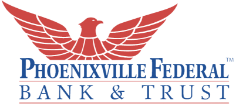Cyber Awareness
Protecting Your Finances from Bank Scams and Fraud
Welcome to Phoenixville Federal Bank & Trust’s comprehensive guide on bank scams, cyber awareness, and online banking security. We are committed to safeguarding the financial well-being of our valued customers in Chester and Montgomery Counties, PA. Our mission is to empower you with the knowledge and tools to prevent bank scams and secure online banking transactions.

What Is a Bank Scam?
Bank scams come in various forms, including phishing, identity theft, and fraudulent transactions. You should familiarize yourself with the different tactics employed by scammers to stay vigilant and protect your finances.
Importance of Cyber Awareness
Stay informed about the latest online threats and scams. Learn to recognize phishing emails that attempt to steal your personal and financial information. Cyber awareness is crucial for:
- Protection against Cyber Threats: Cyber awareness equips individuals and organizations with the knowledge to identify and mitigate various cyber threats, such as phishing attacks, malware infections, ransomware, and data breaches. By being aware of the common tactics employed by cybercriminals, users can take steps to avoid falling victim to these threats.
- Prevention of Identity Theft: Cybercriminals often engage in identity theft to steal personal information and commit fraudulent activities. Being cyber-aware enables individuals to recognize signs of identity theft and take measures to protect their personal and financial information.
- Safe Online Behavior: Many cyber threats rely on user actions, like clicking on malicious links or downloading infected files. Cyber awareness educates users about safe online behavior, including avoiding suspicious links, not downloading files from untrusted sources, and regularly updating software and applications.
- Protection of Financial Information: Online banking, shopping, and financial transactions have become commonplace. Cyber awareness helps users understand the importance of secure connections (HTTPS), avoiding public Wi-Fi for sensitive activities, and regularly monitoring financial accounts for bank fraud.


Resources & Tips for Sending Money Safely
- Confirm your recipient’s contact information. Ensure you have the correct U.S. mobile phone number or email address for the person you want to send money to. When in doubt, contact your friend to double-check.
- Beware of payment scams. If an offer sounds too good to be true, it probably is. For example, is a stranger selling online concert tickets at a steep discount and insisting you pay with Zelle®? Think twice. Make sure you only send money to people you know and trust.
Five Reasons to Make the Switch to eStatements
Making the switch to eStatements can offer numerous benefits for individuals and businesses alike. Here are five compelling reasons to consider transitioning from traditional paper statements to eStatements:
- Get 24/7 access to your statement.
- Decrease your risk for identity theft or mail fraud. Paper statements are easier to lose when delivered through “snail mail.” An eStatement gives you an extra layer of security since it’s sent directly to your online account, where only you have access using your login credentials.
- View your statements as soon as they’re available. With eStatements, you get immediate access to your statement online so you can manage your month-end budget more effectively.
- Become more environmentally friendly. When you switch to eStatements, you’ll do your part in reducing your paper trail and saving trees.
- Declutter and get organized. Your online account acts as a virtual filing cabinet for your statements. Paper statements may be accessed by anyone in your home. Some of them should not see them – burglars, unwanted guests, or even domestic help. eStatements do help make your life simpler.


How to Protect Yourself
Identity theft is a growing concern in today’s digital age, with millions of individuals falling victim to cyber criminals every year. However, there are steps you can take to protect your identity and minimize your risk of falling victim to identity theft and fraud online.
- Strong Passwords – One of the most critical steps in protecting your identity online is to use strong and unique passwords for all your online accounts. Avoid using easily guessable information such as your birthdate or name, and consider using a password manager to generate and store complex passwords.
- Be Cautious With Personal Information – Avoid sharing personal information online, and be wary of unsolicited requests for personal information. Cybercriminals often use phishing scams to trick individuals into giving away their personal information, so it’s essential to be cautious and verify the identity of the sender before sharing any sensitive information.
- Secure Communications – Phoenixville Federal doesn’t send unsolicited emails asking customers to input confidential information. If you receive an email claiming to be from Phoenixville Federal Bank & Trust, don’t reply to the message and call your local branch.
Remember, staying informed and vigilant is the key to preventing bank fraud and financial scams. With Phoenixville Federal’s help, you can confidently navigate the world of online banking while safeguarding your hard-earned money.

